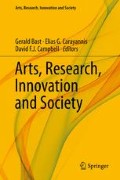Abstract
For thousands of years, knowledge was organized according to the metaphor of a tree. Therefore, we speak of trees of knowledge. These trees hide a hierarchy of knowledge, starting with the Greeks and their differentiation between technê and epistêmês and ending with Ludwig Wittgenstein “The limits of my language mean the limits of my world” (TLP, 5.6). The dominant ideology is, that language serves as the primary medium of knowledge. This essay argues that language was only the first medium to describe the world but we have developed new media, new tools to describe and to construct the world. Technology is seen as an extension of the medium of writing.
Access this chapter
Tax calculation will be finalised at checkout
Purchases are for personal use only
Notes
- 1.
Parmenides (1892).
- 2.
Foucault (1977).
- 3.
Kant (1781).
- 4.
Barthes (1989).
- 5.
Thue (1914).
- 6.
Bacon (1605).
- 7.
Descartes (1644).
- 8.
D’Alembert (1759).
- 9.
Diderot and D'Alembert (1751).
- 10.
ibid.
- 11.
Signac (1911).
- 12.
Popper (1935).
- 13.
Deleuze and Guattari (2004).
- 14.
Baudelaire (1887).
- 15.
Wittgenstein (1921).
- 16.
Ibid., 4.01.
- 17.
Ibid., 4.121.
- 18.
Wittgenstein (1953).
- 19.
ibid., § 7.
- 20.
- 21.
Fuller (1968).
- 22.
Heidegger (1953).
References
Austin JL (1962) How to do things with words. Harvard University press, Cambridge, MA
Bacon F (1605) The advancement of learning [1605]. In: Vickers B (ed) Francis Bacon. A critical edition of the major works. Oxford University Press, Oxford, 1996, pp. 120–299, here p. 189
Barthes R (1989) Sade, fourier, loyola. University of California Press, Berkeley, p. 57
Baudelaire C (1887) Mon Coeur mis á nu [1864], first published in 1887, in: Journaux intimes. Oeuvres complétes. Vol. 1. Ed. Y.-G. Le Dantec and Claude Pinchois, Gallimard, Paris, 1961, pp. 1271–1301
Deleuze G, Guattari F (2004) A thousand plateaus, capitalism and schizophrenia. Continuum, London, p. 7
Descartes R (1644) Les Principes de la philosophie. In: Selections from the principles of philosophy of Rene Descartes (1596–1650) (trans: Veitch J). http://www.gutenberg.org/cache/epub/4391/pg4391.txt
Diderot D, D’Alembert J (1751) Encyclopédie méthodique. Grammaire et littérature, 3 vols., Paris, Liège, 1782–1786, p. XIV. English edition Encyclopédie, preliminary discourse, 1: i–xlv (trans: Schwab RN, Rex WE). http://quod.lib.umich.edu/cgi/t/text/text-idx?c%C2%BCdid;rgn%C2%BCmain;view%C2%BCtext;idno%C2%BCdid2222.0001.083
Foucault M (1977) Nietzsche, genealogy, history. In: Bouchard DF (ed) Language, counter-memory, practice (trans: Bouchard DF, Simon S). Cornell University Press, Ithaca, pp. 139–164, here p. 148
Fuller RB (1968) Operating manual for spaceship earth, [1968]. Simon and Schuster, New York, 1969, p. 133
Heidegger M (1953) Die Technik und die Kehre. English edition: Heidegger M (1977) The Question Concerning Technology and the Turning (trans: Lovitt W). Garland, New York
Kant I (1781) Critique of pure reason. Chapter I. Of the transcendental clue to the discovery of all pure conceptions of the understanding. SS 6. Section III. Of the pure conceptions of the understanding, or categories (trans: Meiklejohn JMD). http://www.gutenberg.org/files/4280/4280-h/4280-h.htm
le Rond D’Alembert J (1759) Essai sur les éléments de philosophie ou Sur les principes des connaissances humaines. In: Kintzler C (ed) Fayard, Paris, 1986
Parmenides (1892) Fragment 3 (trans: Burnet J). http://lexundria.com/parm_frag/1-19/b
Popper K (1935) The logic of scientific discovery [1935]. Routledge, London, 2002, p. 18
Reboiras FD, Varneda PV, Walter P (eds) (2002) Arbor Scientiae. Der Baum des Wissens von Ramon Lull. Akten des Internationalen Kongresses aus Anlass des 40-jährigen Jubiläums des Raimundus-Lullus-Instituts der Universität Freiburg i. Br. Brepols, Turnhout
Roggenbuck S (2005) Die Wiederkehr der Bilder. Arboreszenz und Raster in der interdisziplinären Geschichte der Sprachwissenschaft. Gunter Narr Verlag, Tübingen
Schmidt-Burkhardt A (2005) Stammbäume der Kunst. Zur Genealogie der Avantgarde. Akademie-Verlag, Berlin
Searle JR (1969) Speech acts. Cambridge University Press, Cambridge
Siegel S (2009) Tabula. Figuren der Ordnung um 1600. Akademie Verlag, Berlin
Signac P (1911) D’Eugène Delacroix au néo-impressionnisme. H. Floury, Paris, p. 91f
Thue A (1914) Probleme über Veränderungen von Zeichenreihen nach gegebenen Regeln [Problems concerning the transformation of symbol sequences according to given rules (trans: Power JF 2013]. In: Christiana Videnskabs-Selskabs Skrifter, I. Math.-naturv. Klasse, Oslo, no. 10
Weigel S (2006) Genea-Logik. Generation, Tradition und Evolution zwischen Kultur- und Naturwissenschaften. Wilhelm Fink Verlag, Munich
Wittgenstein L (1921) Tractatus logico-philosophicus, [1921] (trans: Pears D, McGuinness B). Routledge, 1961, p. 3
Wittgenstein L (1953) Philosophical investigations (trans: Anscombe GEM). Blackwell, Oxford, § 23
Author information
Authors and Affiliations
Corresponding author
Editor information
Editors and Affiliations
Rights and permissions
Copyright information
© 2015 Springer International Publishing Switzerland
About this chapter
Cite this chapter
Weibel, P. (2015). The Noetic Turn: From Language-Based to Tool-Based Knowledge Trees. In: Bast, G., Carayannis, E., Campbell, D. (eds) Arts, Research, Innovation and Society. Arts, Research, Innovation and Society. Springer, Cham. https://doi.org/10.1007/978-3-319-09909-5_9
Download citation
DOI: https://doi.org/10.1007/978-3-319-09909-5_9
Published:
Publisher Name: Springer, Cham
Print ISBN: 978-3-319-09908-8
Online ISBN: 978-3-319-09909-5
eBook Packages: Business and EconomicsBusiness and Management (R0)

